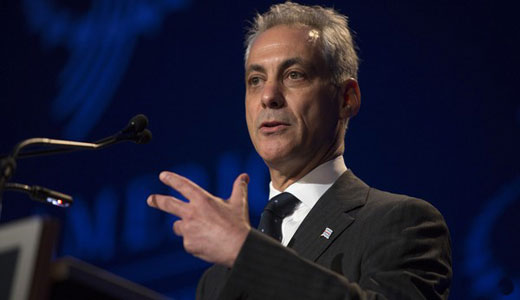
CHICAGO – “When they started talking about the ending of the subsidies, I said I felt like I have one (foot) already in the grave,” said Dorothy Harding, 70, a retired Chicago Public Library employee of more than 33 years. “Now the mayor is cutting us out, [and it’s] starting to feel like I got two feet in the grave.”
Harding was one many city residents to testify about the impact of Mayor Rahm Emanuel’s proposed 2014 budget to a standing room only hearing Oct. 29 convened by the Progressive Reform Caucus of the City Council held at the UE Hall.
For the third year in a row Emanuel is seeking to solve the city budget deficit by starving city services and imposing steep hikes in fees and fines, taxes by another name. They will adversely affect working class communities.
Coupled with an expansion of privatization of public education and city services and an insulation of powerful financial and monopoly corporate interests and the wealthy from paying higher taxes, Emanuel has been dubbed, “Mayor One Percent.”
The Emanuel budget priorities do not address a host of crises facing working class Chicagoans especially the African American and Latino communities. These include crisis level unemployment, particularly among young African Americans, the housing crisis which has forced many working class families, especially African Americans, to leave the city, and gang fueled violence.
At the hearing, residents testified mainly on the impact of cuts to mental health clinics, public worker retiree health care and education.
Health care subsidies for public worker retirees will be phased out by 2017, and retirees face large increases in out of pocket healthcare costs. Emanuel promised the retirees would receive coverage under the Affordable Care Act, but it doesn’t appear to be working that way. And the workers are ineligible for Medicare and Social Security since they never paid into it.
“The mayor has already closed six community mental health clinics and people have died as a result,” said Carol Saywell. “(Cook County) Sheriff Tom Dart complained about all the mentally ill who are filling up the jails. We have a mayor who doesn’t care about people.”
Others mental health clinics joined Saywell. According to the progressive aldermen, it would take only $2.2 million to reopen the clinics.
The aldermen are also critical of Emanuel’s refusal to restore the city police force, which is down 1,000 officers. Last year, the city spent $81 million in overtime rather than hire new officers and this year Emanuel wants to pay $50 million in overtime. Police Superintendent Garry McCarthy maintains the officers are not overworked and it’s cheaper this way.
Emanuel also warned that unless the state legislature solves the public worker pension crisis, the Chicago pension debt will soar to $500 million. While public workers have paid into the pension trust funds, the city like the state, has over the years not paid its obligated share creating the deficit.
The service cuts and higher fees and fines are making it harder for working class families to stay in Chicago. While the proposed budget rules out any new property, sales and gas taxes, over $140 million in revenues is projected from red light and new speed cameras, cigarette taxes, higher cable TV, parking and impound fees.
Emanuel’s budget continues the policy begun under his predecessor Richard M. Daley to cut services, raise fees, expand privatization and eliminate unionized workers while creating favorable conditions to lure tourists, corporations, wealthy and well-paid young professionals to the city, especially the downtown area.
Emanuel refuses to consider one new tax on the city’s wealthy or corporations as a means to raise revenue.
Many of those who testified at the hearing blasted Emanuel’s refusal to return substantial funds from the Tax Increment Financing (TIF) accounts, monies skimmed from property taxes meant for schools and parks.
The city admitted $1.7 billion sits in the accounts but maintains most of it is already committed to development projects. Last year there were $457 million in surplus TIF funds and there are growing demands to return that money to schools.
The Emanuel budget proposes to transfer only $24 million in surplus funds back into the schools, but meanwhile $50 million in TIF funds will go to pay for a new stadium for DePaul University and adjacent hotels.
Beginning last year Emanuel shut down the long time tradition of neighborhood hearings conducted by the mayor. The Progressive Reform Caucus made up of 9 aldermen has stepped in to hold public hearings.
The Progressive Reform Caucus includes Alds. Bob Fioretti (2nd), Scott Waguespack (32nd), John Arena (45th), Toni Foukes (15th), Leslie Hairston (5th), Ricardo Munoz (22nd), Ameya Pawar (47th), Roderick Sawyer (6th), and Nick Sposato (36th).
In opening the hearing, Ald. Waguespack noted, “We as a Progressive Caucus have drawn a line, we can’t ignore these issues (closed mental health clinics and schools, lack of adequate funding for public safety). We have to do something.”
Photo: AP












Comments